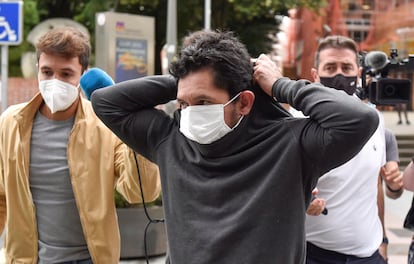Who are the Koala Brothers? Inside the violent youth gang operating in Spain’s Basque Country
Thirteen members, many of them underage, have been arrested for beating a young man into a coma in Barakaldo, where residents are all too familiar with the group’s robberies and assaults


The Basque city of Barakaldo, in northern Spain, has already known two generations of Los Hermanos Koala (The Koala Brothers), a youth gang whose members – aged 15 through 38 – engage in petty theft and minor assaults. But the group, which includes some of the original members from two decades back and new ones who joined in recent years, has just crossed a line.
Thirteen of them have been arrested and could spend a long time locked away after the events of July 25, when they beat a young man into a coma at a park in the nearby town of Amorebieta. Alexandru Andrei Ionita, 23, remains in critical care at Cruces Hospital in Barakaldo. The underage suspects are being held in juvenile centers while at least three adults have been sent to preventive prison at Basauri penitentiary.
This is not the first such incident to take place in the area. On December 23, 2017, a former soccer player for Sociedad Deportiva Amorebieta, Ibon Urrengoetxea, died after being robbed by two youths in downtown Bilbao. The victim was kicked and pushed; he fell to the ground and hit his head against the sidewalk. The assailants, who were 13 and 14 years old, were part of another gang that called itself The Ghetto Family. And in January 2018, two 14-year-olds were arrested in Balmaseda and Bilbao for their alleged involvement in the murder of an elderly couple inside their own home. Both had a criminal record for robbery.
The Koala Brothers imitate the gangs from Central and South America, although their structure is a lot more basic, making it difficult to charge them with being an organized criminal group
In the Basque Country, violent gangs are not exclusive to the province of Bizkaia. In the other two Basque provinces of Álava and Gipuzkoa, there are also gangs whose members meet to fight, commit petty theft and assault people as a way to have fun and as initiation for new members. That is, until things get out of hand and something really serious happens.
But who exactly are the Koala Brothers? Nobody in Amorebieta had heard about them before the assault on July 25, which the gang members recorded and shared on social media. But residents of Barakaldo and other neighboring towns were familiar with them. And they knew about their taste for violence and for hitting people for the sheer pleasure of demonstrating their superiority.
The day of the beating was a Sunday, a day rife with social gatherings and alcohol consumption. On days like these, members of LHK – the acronym used by the gang – get together to pick fights. And they don’t just hang around busy areas filled with nightlife. They also use the cover of night to commit robberies and beat anyone who is unlucky enough to cross their path. No motive is necessary. A fleeting glance by the victim will do.
Javier (an assumed name), remembers his encounter with gang members last summer. “I was out for a walk with my girlfriend when four guys came up to us. They surrounded us and stole our phones and money.” The young couple did as they were told. “If you move, I’ll slash you,” said one of the assailants, holding something in his hand that might have been a knife, although it was hard to see.
César San Juan, a professor of criminal psychology at the Basque Country University, says that 85% of minors who commit acts of violence do not do it again. “The problem is the remaining 15% that keeps going in and out of the courthouses, with the additional factors of early school leaving, dysfunctional families and bad company... and they start building up a criminal record.” That is the typical background of LHK members. “Many of them come from broken homes where there was, or still is, violence between spouses,” said a social worker from Bilbao who requested anonymity.
If we find them carrying a knife, we slap them with a €600 fine, but there is little else we can do except keep monitoring themBasque police source
The Koala Brothers imitate the gangs from Central and South America, although their structure is a lot more basic, making it difficult to charge them with being an organized criminal group. The older members are the role models for the younger ones, and personal merit is built on one’s criminal history, number of court appearances and time spent at juvenile centers.
The Basque police – the Ertzaintza – are familiar with them after years of street fights, robberies and assaults. Every so often, local police precincts issue reports with assessments on whether a given gang member is getting more radical, or whether the group’s activities are evolving towards more serious kinds of crimes.
The Ertzaintza figures that there are no more than 30 active members in LHK, and with the arrest of 13 of them, the group could be said to be practically broken up. But there are other gangs who could take over from them. “LHK wasn’t exactly one of the more active gangs,” said one police officer. In 2019, law enforcement had tabs on 24 such groups in the Basque Country alone. They typically meet for street fights, and the police step in to card them.
Most of them are underage, which means they walk in and out of the courtroom on the same day and go back to their petty crimes. “If we find them carrying a knife, we slap them with a €600 fine, but there is little else we can do except keep monitoring them,” said a source at the Ertzaintza.
English version by Susana Urra.
Tu suscripción se está usando en otro dispositivo
¿Quieres añadir otro usuario a tu suscripción?
Si continúas leyendo en este dispositivo, no se podrá leer en el otro.
FlechaTu suscripción se está usando en otro dispositivo y solo puedes acceder a EL PAÍS desde un dispositivo a la vez.
Si quieres compartir tu cuenta, cambia tu suscripción a la modalidad Premium, así podrás añadir otro usuario. Cada uno accederá con su propia cuenta de email, lo que os permitirá personalizar vuestra experiencia en EL PAÍS.
¿Tienes una suscripción de empresa? Accede aquí para contratar más cuentas.
En el caso de no saber quién está usando tu cuenta, te recomendamos cambiar tu contraseña aquí.
Si decides continuar compartiendo tu cuenta, este mensaje se mostrará en tu dispositivo y en el de la otra persona que está usando tu cuenta de forma indefinida, afectando a tu experiencia de lectura. Puedes consultar aquí los términos y condiciones de la suscripción digital.








































